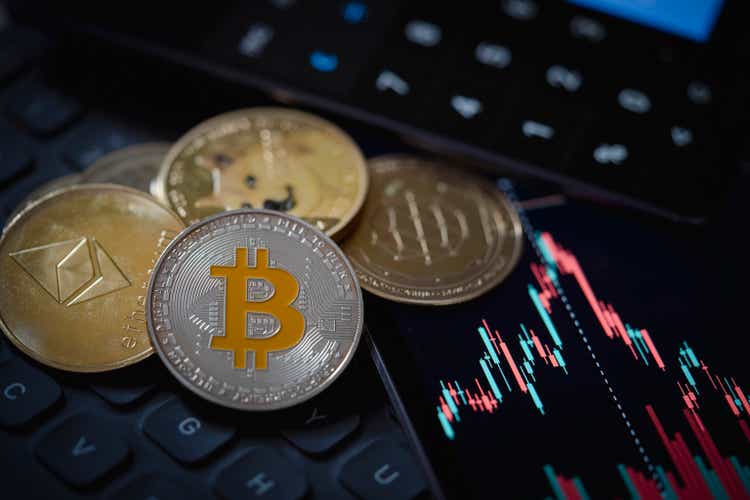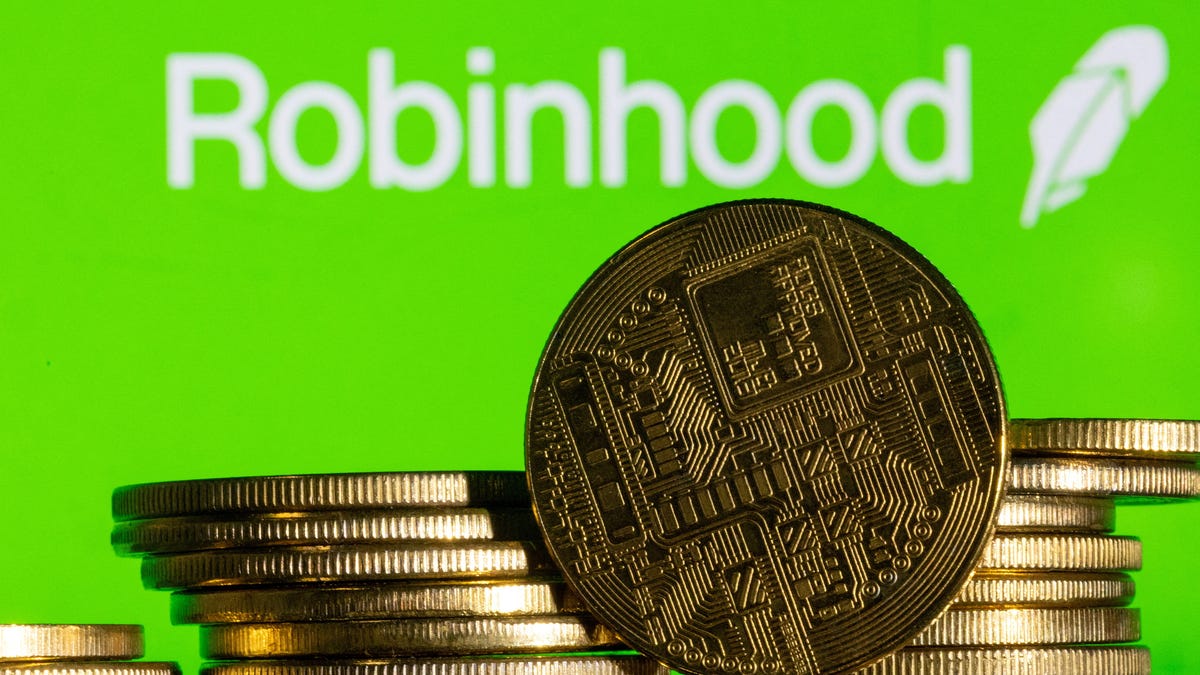Crypto
Does The SEC’s Cryptocurrency View Differ That Much From The Rest Of The World?

SEC Chairman Gary Gensler wants the cryptocurrency investing market to look more like the … [+]
The Securities and Exchange Commission does not like exchanges issuing their own tokens, making commissions and fees off trades of other tokens, nor does it like exchanges acting as clearinghouses or custodians for their client’s cryptocurrencies. But this is usually how it goes in the rest of the world.
However, new rules in Hong Kong require exchanges to contract third parties or set up another entity to act as custodians of client funds for better investor protection. Traditional securities regulators are increasingly muscling in on cryptocurrency and want to bend it to look like old-school financial services.
The latest victory for Ripple Labs in their battle with the SEC shows that when it comes to cryptocurrency investing, the exchange players are saying they are not the NYSE and should not be treated as such. So far, this view is winning even as regulators hack away at it with more fervor.
While different than the Coinbase vs SEC case, the judge in the Ripple Labs case, Analisa Torres, ruled that some cryptocurrency transactions do not count as securities sales. Although the district court decision is not binding elsewhere, it does indicate that the SEC’s insistence that most digital assets are securities that should be registered–which is impossible to do under current regulations–can be successfully challenged, Forbes reported on July 13.
Without getting into the merits of either case, SEC Chairman Gary Gensler is of the mind that a cryptocurrency exchange is akin to any securities exchange – they exist to sell investable products, and as retail investors cannot buy and sell stocks directly from Nasdaq, nor can Nasdaq make a commission off retail investor trades, neither should digital asset platforms. Cryptocurrency exchanges are in a gray zone. (The big exchanges do charge fees off floor traders and institutional investors like BlackRock
BLK
Gensler views cryptocurrency markets through the same lens as traditional stocks and bonds, which would require existing exchanges to be splintered into different businesses. They may eventually be allowed to host tokens on their exchange but will have to set up separate entities for custodianship and clearinghouse activities for all investors, not just big-money investors. This seems to be the case.
“Most crypto tokens are subject to the securities laws. Most crypto intermediaries have to comply with securities laws as well,” Gensler said June 8 at the Piper Sandler Global Exchange & Fintech Conference. The Exchange Act requires intermediaries, in this case exchanges acting as brokers between cryptocurrency issuers and investors, to register as agents or satisfy requirements for exemption.
“In other parts of our securities markets, the exchange, broker-dealer, and clearing functions are separate,” Gensler said in what may go down as one of his most clear pronouncements of how he sees cryptocurrency investing platforms in the same light as traditional financial services. “Separation of these core functions helps mitigate the conflicts that can arise with the commingling of such services,” he said. “These crypto entities know the rules.”
They may know the rules, but they also think they are unclear and do not reflect the realities of this blockchain-based, finance market.
Coinbase CEO Brian Armstrong is in what may become an industry deciding lawsuit with the SEC over … [+]
In April, Coinbase
COIN
“Anything is on the table, including relocating or whatever is necessary,” CoinDesk reported him saying on April 18 during Fintech Week in London. “I think the U.S. has the potential to be an important market for crypto, but right now we are not seeing that regulatory clarity that we need.”
Cryptocurrency Outside the U.S.
The grass is greener elsewhere for the cryptocurrency sector.
Justin Sun, Founder of Tron and Advisor to Huobi
HT
“The exchanges can accept clients and charge fees,” Sun says, referring to the broker/dealer setup.
In financial services, the legal entity that facilitates security trading is an agent acting on behalf of investors. When investors want to trade bitcoin, for example, an exchange that helps them make that transaction is akin to the investor’s agent, or broker.
Different regulators have different approaches, but the most common today is the separation of the exchange and custodian business. Separating exchange platforms from commission and fee-collecting financial services defeats the purpose of creating an exchange in the first place.
A Bybit display in Dubai as seen last year at an event in UAE city. ByBit is one of the top five … [+]
“Our license to operate an exchange in the United Arab Emirates is based on our license application, in which you can select digital asset facility service and custody together,” says Ben Zhou, co-founder and CEO of Bybit, a top-five exchange by volume, according to CoinMarketCap. “Once you get the license, it will be approved based on what you applied for. Whereas in Hong Kong, due to the local regulations, you will need different entities to apply for activities of custody and digital asset facilities,” he says, meaning the two must be separate entities — one handling the company’s financial assets and the other holding the financial assets of its investors. The SEC is against the commingling of funds.
“Whether companies like Coinbase and Gemini can survive the SEC requirements is a matter for further observation,” Zhou says.
Zhou said that Bybit is exploring custodian models where funds are segregated and held by a third party.
Other countries have lackluster rules, which make investing risky.
In Turkey, for example, the regulation for cryptocurrencies falls under the Capital Markets Board (SPK), with stricter rules enforced by the Regulation on the Non-Use of Crypto Assets in Payments.
“This rule does not ban cryptocurrency exchanges or investments, but they limit the intermediation of transfer transactions via payment and intermediary institutions,” says Yusuf Sevim, CEO at MetaTime, an Istanbul-based fintech building a new cryptocurrency exchange.
For exchanges, the rules regarding the separation of a company into an exchange operator, broker/dealer, and custodian can vary in Turkey.
“The regulatory landscape in Turkey is currently quite complicated and unregulated,” Sevim says, adding that companies that want to make a serious go in the digital assets space need to be in touch with regulators to make sure they do not run afoul of “non-rules” that become “rules.” Companies that are thinking long-term, even in emerging markets where there is more of a Wild West mindset, do not want to breach the trust of securities regulators. They know what would happen if they did, seeing million-dollar lawsuits waged from the U.S. against numerous exchanges, large and small. There is concern that the local securities regulators could do the same.
A New Hong Kong Model for Exchanges
The Hong Kong Securities and Futures Commission (SFC) launched a new virtual asset regulatory framework which took effect on June 1, 2023. This applies to any exchange offering services to clients in Hong Kong. Custody of client funds must be a separate business.
Reflection of an advertisement displaying a Bitcoin cryptocurrency token is seen in Hong Kong, … [+]
Under the new HK licensing regime, virtual asset service providers (VASPs), referring to all centralized virtual asset trading platforms, must be licensed by the SFC to offer any type of cryptocurrency service in the city. The SFC further encourages VASPs to seek both a Type 7 license for virtual asset trading services and a Type 1 for dealing in (traditional) securities so that they satisfy both potential security tokens and non-security tokens’ licensing requirements, says Stephan Lutz, CEO of BitMEX. Lutz is registering BitMex under this system now.
“The license standards are comprehensive and cover all expected areas with an underlying focus on user protection, including safe and segregated custody of assets,” Lutz says.
Under the new VASP regulatory framework in Hong Kong, exchanges must segregate custody of customers’ assets by a wholly owned subsidiary of the exchange entity or third party.
Since cryptocurrencies are decentralized, much of the responsibility for storing them safely falls on the owner. Some companies might require customers who have not accessed their account in a long time to type in a massive recovery password. If investors forget that password, they are locked out of their account. That would be akin to forgetting your Vanguard 401(k) log-in, and no longer having access to your retirement funds.
Coinbase has a separate custody service, but it is only for institutional clients with $10 million in digital assets. Coinbase Custody is a separate entity from Coinbase.
The SFC requires customers’ assets to be held in cold storage. Coinbase Custody is also cold storage, meaning it is not connected to the internet.
Hong Kong cryptocurrency exchanges must also ensure that their insurance policy, or equivalent financial protection, covers not less than 50% of all assets held in cold storage and 100% of all assets in hot storage online, which is subject to cybersecurity risk.
“The SFC’s custody regulations are part of its wider push to ensure that all customer assets are stored safely and not commingled with the assets of the exchange,” says Lutz about Hong Kong’s cryptocurrency rules. “It is a shared responsibility with the regulators from the lens of the law – building trust and co-creating an ecosystem that both can comprehend.”
For the Hong Kong crypto market, a custodian entity can be a subsidiary of the exchange entity. The custodian entity is responsible for holding customers’ assets, and the licensed exchange is the ultimate gatekeeping entity to assure the customers’ assets are segregated and protected.
“We find this structure clear and efficient as it avoids involving multiple entities within the same group seeking licenses for the same underlying business,” says Lutz.
As far as exchanges operating as broker/dealers, changing that model will disrupt the cryptocurrency financial services market. If this is ultimately what the SEC wants, they might as well just force Nasdaq to buy the main exchanges operating here.
“If more parties are needed to be involved in trades, the harder it can be for the industry to provide the seamless real-time trading experience the customers have been enjoying so far,” says Lutz from BitMEX.
Saad Naja, CEO at Boxwind, an upcoming London-based exchange that’s a part of Exinity group, a global fintech organization, said he understands Gensler’s view.
“But if you apply traditional financial regulations to the emerging market of cryptocurrencies, this simply will not work,” Naja says. “The unique nature of cryptocurrencies and blockchain technologies cannot be applied to these traditional regulatory frameworks. Companies like Coinbase and Gemini, which serve as both exchanges and custodians, have been instrumental in the growth and adoption of cryptocurrencies. They provide a user-friendly interface for buying, selling, and storing cryptocurrencies, which has made it easier for the general public to get involved in this new asset class. If the SEC insists on separating these roles, it could potentially disrupt the current business models of these companies, driving cost and complexity into these businesses,” Naja says.

Crypto
Cryptocurrency exchanges to evaluate listed coins

Representations of cryptocurrencies Bitcoin, Ethereum, DogeCoin, Ripple, Litecoin are placed on a PC motherboard in this illustration. REUTERS-Yonhap
Implementation of Korea’s first cryptocurrency act on user protection to take effect from July 19
By Anna J. Park
With the implementation of Korea’s first law on virtual asset user protection, due to occur on July 19, cryptocurrency exchanges are set to comprehensively review the listing status of over 600 virtual assets currently being traded.
According to the Financial Supervisory Service (FSS) and the virtual asset industry on Sunday, 29 cryptocurrency exchanges registered to the financial authorities, including Upbit, Bithumb, Coinone, Korbit and Gopax, must regularly evaluate whether to continue supporting the trading of their listed coins.
The exchanges are each required to set up their own evaluation and decision-making body within their organizations, with the said bodies assessing the reliability of the issuer of their listed coins, user protection measures, technology and security and compliance with regulations.
With regards to assets like Bitcoin, of which the issuer is not specified, alternative review criteria will be introduced.
When cryptocurrency coins do not meet certain standards, they will be designated as cautionary and will face delisting.
“Financial authorities will support cryptocurrency exchanges to conduct reviews on their listed coins every six months regarding whether to continue supporting the trading of the virtual assets. After this initial review, the exchanges will be required to conduct maintenance reviews every three months,” an official from the financial authorities said.
Financial authorities are also preparing guidelines for virtual asset transactions, aiming for them to be utilized by virtual asset exchanges from next month, when the virtual asset user protection law is set to come into effect.
The figures from the Korea Financial Intelligence Unit under the Financial Services Commission (FSC) showed that the total number of cryptocurrency coins listed on the domestic virtual asset exchanges stood at around 600 as of the second half of last year, which is about a 3.5 percent fall compared to the first half of last year.
Meanwhile, the financial authorities are also preparing a change in their internal structures to devise policies on the cryptocurrency industry effectively.
The FSC plans to establish a new bureau solely dedicated to virtual assets so as to oversee the overall regulatory framework for the virtual asset industry as early as the end of this month.
The FSC’s organizational amendment, which includes these details, will complete its legislative notice by Monday and will be reviewed by the cabinet meeting on Tuesday.
The FSS is also gearing up for its supervision and investigations into unfair trade in the virtual asset sector at two new bureaus established at the end of last year.
Crypto
Crypto Deposits to Chinese Drug Producers' Addresses Double in Early 2024 Compared to 2023

Blockchain intelligence firm TRM Labs has revealed that cryptocurrency deposits into crypto addresses linked to Chinese drug precursor manufacturers more than doubled in the first four months of 2024 compared to the same period in 2023.
In 2023, Chinese precursor networks received over $26 million in cryptocurrency, with 97% of the over 120 manufacturers studied offering payment options in digital currencies.
Bitcoin Dominates Transactions
According to TRM Labs, the overall amount of cryptocurrency deposited into wallets linked to these manufacturers increased by more than 600% from 2022 to 2023.
Bitcoin remains the dominant cryptocurrency used for these transactions, accounting for approximately 60% of the total payment volume. Following Bitcoin, the TRON blockchain saw about 30% of transactions, while Ethereum was used for roughly 6%.
The report also highlighted that 11 manufacturers were responsible for over 70% of all crypto-denominated sales of drug precursors. These manufacturers receive funds from unhosted wallets, cryptocurrency exchanges, and payment services, with their wallets most commonly hosted at exchanges.
In addition to the preference for cryptocurrencies, Chinese manufacturers also accept fiat currencies through platforms like PayPal, MoneyGram, Western Union, and traditional bank transfers.
The report revealed that Chinese drug precursor manufacturers mainly target countries including Canada, the Netherlands, Australia, Germany, and the United States. Advertisements have also been directed towards Russia and neighboring countries, particularly for mephedrone precursors.
China’s Role in The US Fentanyl Crisis
A U.S. congressional committee recently reported that the root cause of the U.S. fentanyl crisis lies in the People’s Republic of China, which manufactures over 97% of the precursors used in the global illicit fentanyl trade.
According to the report, China subsidizes the production of illicit fentanyl precursors, which has significantly contributed to the opioid crisis in the United States.
“The CCP has had this program in place since at least 2018. At that time, they subsidized at least 17 illegal synthetic narcotics that are Schedule I controlled substances, including 14 deadly fentanyl analogues.”
The committee found that China provides value-added tax rebates to companies manufacturing fentanyl analogs and other synthetic narcotics, provided these products are sold outside China.
Another September 2023 report by blockchain intelligence firm Elliptic also uncovered a network of 100 individual suppliers facilitating the illicit fentanyl trade. Elliptic noted that these suppliers use cryptocurrencies, particularly Bitcoin, Ethereum, Tron, and Monero, to conduct transactions and facilitate the transfer of funds from buyers to suppliers.
Binance Free $600 (CryptoPotato Exclusive): Use this link to register a new account and receive $600 exclusive welcome offer on Binance (full details).
LIMITED OFFER 2024 at BYDFi Exchange: Up to $2,888 welcome reward, use this link to register and open a 100 USDT-M position for free!
Crypto
Cryptocurrency startup funding surpasses $100B (Cryptocurrency:BTC-USD)

bizoo_n
Cryptocurrency startups have drawn over $100B in total funding since 2014, as per data compiled by DeFiLlama, with $3.54B raised up to May this year alone amid a surge in bitcoin (BTC-USD) and other digital tokens.
DeFiLlama is an aggregator that tracks the crypto sector’s total value locked – or the total U.S. dollar value of digital assets locked, or staked, on a particular blockchain network via decentralized finance platforms.
According to the data, since 2014, crypto startups have seen a total of 5,287 funding rounds that have raised in total $101.36B. October 2021 was the best month in this time period, with over $7B raised.
Earlier this year, crypto industry news and research outlet The Block said the total, all-time dollar amount invested into crypto and blockchain-related companies exceeded $90B in February. The firm cited funding data for startups that it tracked since 2017.
The $100B milestone comes a few months after the crypto industry received a shot in the arm from the U.S. Securities and Exchange Commission’s (SEC) long-awaited approval of spot bitcoin (BTC-USD) exchange-traded products in January.
Not long after, bitcoin (BTC-USD) surged to a record high north of $73,000 in March, though it has since retreated after its last halving on April 19, 2024. Halving events reduce the rate at which new coins are created and thus lower the available amount of new supply.
For investors that want to track bitcoin (BTC-USD) focused funds, here are some names to look at: (IBIT), (GBTC), (FBTC), (ARKB), (BITB), (HODL), (BRRR), (BTCO), (EZBC), and (BTCW).
More on Bitcoin and Crypto
-

 News1 week ago
News1 week agoIsrael used a U.S.-made bomb in a deadly U.N. school strike in Gaza
-

 World1 week ago
World1 week agoFrance to provide Ukraine with its Mirage combat aircraft
-

 News1 week ago
News1 week agoNonprofit CFO Accused of 'Simply Astonishing' Fraud
-

 World1 week ago
World1 week agoRussia-Ukraine war: List of key events, day 833
-

 Politics1 week ago
Politics1 week agoGeorge Clooney called White House to complain about Biden’s criticism of ICC and defend wife’s work: report
-

 Politics1 week ago
Politics1 week agoNewson, Dem leaders try to negotiate Prop 47 reform off California ballots, as GOP wants to let voters decide
-

 World1 week ago
World1 week ago‘Bloody policies’: Bodies of 11 refugees and migrants recovered off Libya
-

 Politics1 week ago
Politics1 week agoEmbattled Biden border order loaded with loopholes 'to drive a truck through': critics




















